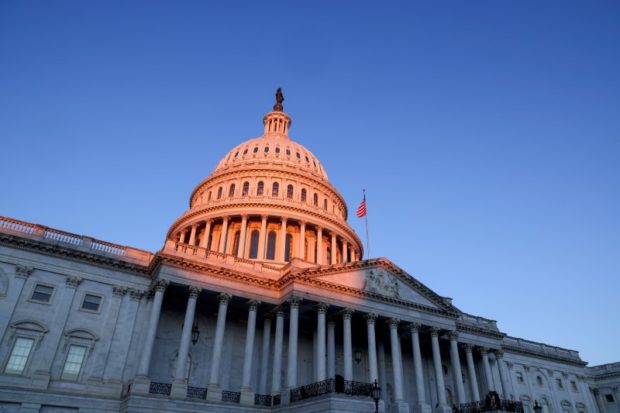US Senate pivots to $3.5 trillion bill, key to Biden’s agenda

The sun rises on the U.S. Capitol dome before Joe Biden’s presidential inauguration in Washington, U.S., January 20, 2021. REUTERS FILE PHOTO
WASHINGTON — The Democratic-controlled U.S. Senate on Tuesday passed a massive infrastructure bill and immediately kicked off debate on a $3.5 trillion spending blueprint for President Joe Biden’s key priorities on climate change, universal preschool and affordable housing.
The bipartisan $1 trillion infrastructure bill, which the 100-member chamber passed in a 69-30 vote, could provide the nation’s biggest investment in decades in roads, bridges, airports and waterways.
U.S. stocks headed to fresh records on the news.
With a razor-thin majority in the Senate, Democrats pivoted quickly to a budget resolution containing spending instructions for the multi-trillion-dollar follow-up package. They plan to push the package through over the next few months, using a process called “budget reconciliation,” which bypasses the chamber’s normal rules requiring 60 votes to pass most legislation.
House of Representatives Speaker Nancy Pelosi has repeatedly said that her chamber will not take up the infrastructure bill or spending package until both are delivered, which will require the Democratic leadership to hold its narrow majorities in Congress together to get the legislation to Biden’s desk.
Article continues after this advertisement“Today we move this country in a very different direction” with a budget plan that will “ask the wealthiest people in our country to start paying their fair share of taxes,” Senate Budget Committee Chairman Bernie Sanders, one of the Senate’s most liberal members, said on Tuesday as debate began.
Article continues after this advertisementSenator Lindsey Graham, the top Republican on the budget committee, railed against the spending plan, saying it would fuel inflation, lead to higher taxes and energy costs for working Americans and open the border to more illegal immigration.
“In 2022, this idea will be on the ballot, and my goal and my Republican colleagues’ is to fight like hell,” Graham said, referring to next year’s contests that will determine control of Congress.
The Senate on Tuesday began a “vote-a-rama,” a process that gives senators the opportunity to propose amendments to the budget resolution. Debate can run for days unless party leaders agree to a shorter period.
House Majority Leader Steny Hoyer, a Democrat, said the House would return from its summer break early on Aug. 23 to consider the budget resolution, if the Senate passes it.
Polls show the drive to upgrade America’s infrastructure, hammered out over months by senators from both parties, is broadly popular with the public. The bill includes $550 billion in new spending, as well as $450 billion in previously approved infrastructure investment.
Biden praised the infrastructure bill in remarks at the White House, saying the planned investments would “allow us to out-compete the rest of the world.”
The president also lauded the courage of the 19 Republicans who voted for the bill, saying it showed that bipartisanship is not a “relic of an earlier age.”
Republicans oppose raising debt
But dozens of Republican senators hit back at the Democrats’ ambitious spending plans by signing a pledge not to vote to raise the nation’s borrowing capability when it is exhausted in the autumn.
“They (Democrats) shouldn’t be expecting Republicans to raise the debt ceiling to accommodate their deficit spending,” Senator Ron Johnson, a Republican who circulated the pledge, told the Wall Street Journal, which first reported on it.
Failure to increase or suspend the statutory debt limit – now at $28.5 trillion – could trigger a federal government shutdown or a debt default.
Treasury Secretary Janet Yellen this week urged Congress to raise the debt limit in a bipartisan vote. On Tuesday, Yellen also endorsed the idea of a follow-up spending package, saying the $1 trillion infrastructure plan should have a sequel.
“Because if we truly want to build a stronger economy, we must invest not just in infrastructure, but in other public goods like childcare, education, and affordable housing,” she said in a statement.
The nonpartisan Congressional Budget Office last week said the $1.2 trillion infrastructure bill would increase federal budget deficits by $256 billion over 10 years. The assessment was rejected by negotiators who said the CBO was undercounting how much revenue it would generate.
Senate Minority Leader Mitch McConnell, who voted for the infrastructure bill, called the $3.5 trillion package Democrats sought “radical”. He said it would create a permanent welfare state and usher in the largest peacetime tax hike in U.S. history.
Once the budget resolution is adopted, Democrats will begin crafting the reconciliation package.
The budget plan would provide various Senate committees with top-line spending levels for a wide range of federal initiatives, including early childhood education and investments to reduce carbon emissions blamed for climate change.